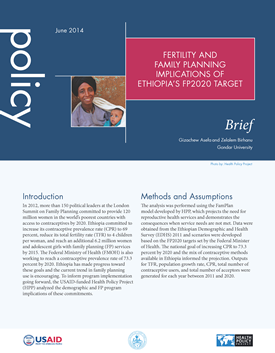The Health Policy Project ended in 2016. Work continued under Health Policy Plus (HP+) until 2022.
PUBLICATION
Author(s): Gizachew Asefa, Zelalem Birhanu
Primary Language: English
Date: 6/1/2014
Abstract:
The USAID-funded Health Policy Project supported partners at Gondar University to use the FamPlan model to analyze the demographic and family planning program implications of meeting Ethiopia’s Family Planning 2020 (FP2020) targets. The projections show that, if Ethiopia achieves a contraceptive prevalence rate of 73.3 percent by 2020 (the target set by the Federal Ministry of Health), the total fertility rate would fall to less than two children per woman in 2020 and the annual population growth rate would slow to less than 1 percent by 2020. In addition, under-five and infant mortality rates would drop significantly due to increased use of family planning. The model projection also estimated the number of contraceptive commodities required to achieve the target, which can be used to ensure contraceptive security.
Brief Contraceptive Security Family Planning/Reproductive Health (FP/RH) FamPlan FP2020/30 Modeling Ethiopia


